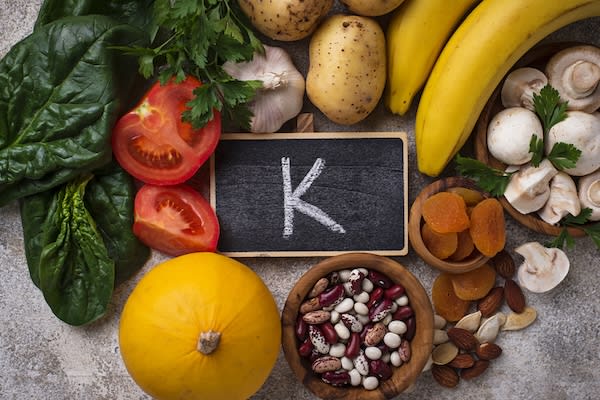More than bananas – Why potassium is important for your diet
[5 MIN READ]
In this article:
-
If you don’t consume enough potassium, you may experience muscle weakness and cramping.
-
Besides bananas, other good sources of high potassium include oranges, raisins, bran cereal and whole-wheat bread.
-
A heart-healthy diet includes consuming the recommended amounts of potassium.
A complete guide to potassium
You’ve probably heard how important it is to include enough calcium in your diet. And you may be familiar with the danger of iron deficiency. But what about potassium? That’s an important mineral, too, and you could suffer health consequences if you don’t get enough.
What does potassium do to the body?
Potassium plays many critical roles in your body — it works alongside sodium to maintain fluid balance, and partners with other minerals like calcium and magnesium to regulate electrolyte levels. In fact, potassium itself is an electrolyte, which means it carries an electrical charge that performs important functions in your body.
“Potassium helps your nerves send signals, which allows your muscles, including the heart, to contract effectively,” says Debrin Cohen, MS, RD, CNSC, a registered dietitian at Providence. “It also supports healthy blood pressure by relaxing blood vessels, which reduces your risk of stroke.”
Fluid balance is a particularly important function of potassium. If you have been sweating heavily in extremely hot weather, you might grab a drink like coconut water to rehydrate yourself. Coconut water is a natural source of electrolytes and potassium, and with no added sugar, it will help you feel better right away.
Potassium also acts as a counterpart to sodium, which is also an electrolyte. While sodium is good for your body in small amounts, too much can lead to high blood pressure and a risk of heart disease. A diet rich in potassium balances out your sodium levels and can also reduce your chance of kidney disease or bone loss.
Symptoms of low potassium
When you have a potassium deficiency, called hypokalemia, you may experience muscle weakness and cramps because your muscles aren’t functioning properly. You might also suffer from constipation, fatigue and potentially dangerous irregular heart rhythms, called arrhythmias.
“Some people may feel tingling or numbness, like a pins-and-needles sensation, because of the impact on nerve function,” Cohen says.
Hypokalemia can result from factors such as prolonged vomiting or diarrhea, excessive sweating, certain medications like diuretics, or simply not eating enough potassium-rich foods.
On the other hand, too much potassium, or hyperkalemia, can also lead to muscle weakness, fatigue and heart arrhythmias. “Hyperkalemia is more common in people with kidney disease or those who are taking medications that impact potassium levels,” says Cohen. “Maintaining a balanced potassium intake is incredibly important for your overall health.”
Foods high in potassium
Believe it or not, bananas aren’t the only food that’s rich in potassium. Potatoes — especially the skins — are also packed with potassium. Leafy greens like spinach, citrus fruits such as oranges, avocados, sweet potatoes, and melons like cantaloupe are all great choices. Beans, lentils and yogurt also provide a good amount of potassium to a balanced diet.
Other good sources of potassium include:
- Apricots
- Bran cereal
- Brown and wild rice
- Cooked broccoli
- Cucumbers
- Dates
- Grapefruit
- Honeydew
- Juice from potassium-rich foods like tomato, grapefruit, prune and orange juice
- Molasses
- Mushrooms
- Nuts
- Peas
- Prunes
- Pumpkins
- Raisins
- Salt substitutes
- Trout
- Tuna
- Whole-wheat bread and pasta
- Zucchini
Recommended daily intake of potassium
The recommended daily intake of potassium varies based on age, sex, specific life stages, certain health conditions and lifestyles. According to the American Heart Association, men should consume about 3,400 milligrams per day, while women need about 2,600 milligrams per day. When a woman is pregnant or breastfeeding, she will need even more potassium in her diet.
While potassium is present in many different foods, most Americans only get about half of their daily requirement. Eating a balanced diet with plenty of vegetables, fruits and other potassium-rich foods can help you meet your daily needs. The American Heart Association recommends the DASH diet, which stands for Dietary Approaches to Stop Hypertension (high blood pressure). The diet includes fruits and vegetables, whole grains, low-fat dairy and fish as a protein source.
Though it might be tempting to try to boost your potassium intake through supplements, never take a supplement without a doctor’s prescription. This can cause your potassium to go in the other direction, causing high levels that can be dangerous.
Dietary Guidelines for America provides a handy table that lists the amounts of potassium in various kinds of foods. If you’re not sure whether you’re getting enough potassium each day, check it out to see if you need to add more potassium-rich foods to your diet.
Contributing caregiver
Debrin Cohen, MS, RD, CNSC, is a registered dietitian at Providence.
Find a doctor
If you are looking for a Providence provider, you can search for one in our provider directory.
Download the Providence app
It’s all in the app: Easily stay connected with Providence and your health. With the Providence app, you can schedule appointments, have virtual visits from the comfort of your own home, get health recommendations personalized for you, access your health records and so much more. Learn more and download the app.
Related resources
Healthy eating tips for older adults
8 ways to start lowering your blood pressure today
This information is not intended as a substitute for professional medical care. Always follow your health care professional’s instructions.




